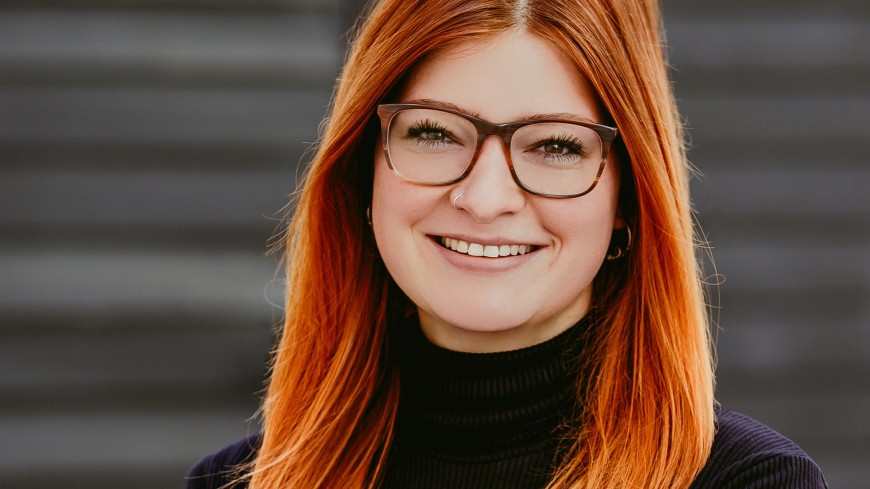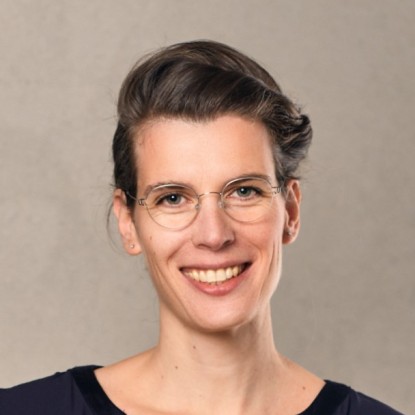New long-term guest at the Department: Prof. Isabella Graßl
First Gender Mint Professorship for Computer Science
2025/03/11
From March, we will welcome Dr. Isabella Graßl as our first Gender MINT Visiting Professor of Computer Science for two years. In her background and research, she combines computer science and the humanities: she holds Bachelor's degrees in Internet Computing and in Linguistics and Textual Studies, as well as Master's degrees in Computer Science and in Textual and Cultural Semiotics from the University of Passau. She completed her doctorate there with a thesis on diversity in programming education. The 32-year-old brings international research experience from the University of Cambridge, where she was most recently a Research Associate in Computing Education. The visiting professorship is based in the Software Engineering Research Group of Prof. Mira Mezini. It is funded by the German Federal and State Government's Women's Professorship Programme III in the first year and by the Department itself in the second year. To get to know her better, we asked her a few questions

Please describe your research in one paragraph.
My research focuses on the human and social aspects of software engineering. I study how diversity – be it in terms of gender, culture and ethnicity, worldview, work experience and disability – affects collaboration in technical teams. Essentially, the aim is to better understand how people interact in software teams and how successful collaboration can improve code quality. The extent to which artificial intelligence will be more than just a development tool in the future and act as a 'real' collaborator in the team is also currently playing a central role. I am particularly interested in research on the promotion of young talent. I am focusing on creative and gender-sensitive approaches to get children and young people interested in computing, regardless of their gender or social background. Such approaches are particularly aimed at groups that feel underrepresented in the field.
Why should students be interested in your topics? / What is exciting about your topics?
My courses offer a diverse mix of creative and socially relevant topics that are often neglected in computer science. Many people think of software development in technical terms and see the field as male-dominated. But there is so much more to software development than code! For me, it is about people and how they work together. Students learn the technical basics, of course, but they quickly realise that the real success of a project often depends on the dynamics within the team – the ability to communicate effectively, resolve conflicts and stay motivated, especially in stressful situations. Many people have experienced this themselves: teams often fail not because of technology, but because of interpersonal relationships. These are the challenges we address in my classes and make tangible for the students. Anyone interested in topics such as diversity, teamwork, society, creativity and design in computing will find a home in my courses.
You joined the department as a Gender Mint Professor – at what level or with what projects do you plan to introduce the topic?
For me, gender in STEM is about breaking down barriers in computing and making it as accessible and attractive as possible for all genders. For me, it's about creating a culture where diversity is not only respected but actively encouraged. I believe that teams with a high level of diversity, i.e. as many different perspectives as possible, come up with better and more creative solutions. Specifically, I would like to expand the course offerings to include courses that emphasise the creative, communicative and collaborative aspects of software development. This could include, for example, research seminars on gender diversity in technical teams and hands-on labs where students work with no/low-code platforms. The focus is not only on technical output, but also on user needs and team dynamics.
I am particularly interested in interdisciplinary approaches, such as collaborating with the humanities to bring the social context into computing education. I also want to get involved in outreach projects, such as Girls' Day or similar formats. I want to get girls and young women interested in computer science at an early age and show them how diverse and creative the field is.
In which TU department or research group would you like to spend a day? Why?
As I have already gained many impressions of the social and historical sciences through my second degree, I would like to get to know the Department of Civil and Environmental Engineering, which was previously foreign to me. I am particularly interested in how technologies and materials are researched and developed in and under extreme environmental conditions – whether in the Alps, the desert or the deep sea. I also find the exploration of extraterrestrial environments such as Mars very exciting and would love to visit the TURM observatory. Such topics also make me think about the many challenges of our time.
If I were a student today, I would …
… definitely attend even more interdisciplinary and interdisciplinary events and seek dialogue with students from other disciplines. Studying is the perfect opportunity to think outside the box and gain incredibly valuable new perspectives. At the same time, I would take more time to enjoy student life to the full. You rarely have this enormous freedom during your studies later on, so it's important to really appreciate and consciously experience it.
The best balance to a stressful working day is …
… spending time in nature. The best way to do this is to go for a long hike in the mountains, because then your head feels completely clear again and many problems seem so insignificant. These moments of happiness are only topped by a delicious Kaiserschmarrn at a mountain hut! I'm looking forward to trying out the wine hikes in Darmstadt and the surrounding area :)


